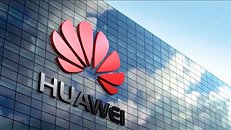- Joined
- Oct 9, 2007
- Messages
- 47,300 (7.53/day)
- Location
- Hyderabad, India
| System Name | RBMK-1000 |
|---|---|
| Processor | AMD Ryzen 7 5700G |
| Motherboard | ASUS ROG Strix B450-E Gaming |
| Cooling | DeepCool Gammax L240 V2 |
| Memory | 2x 8GB G.Skill Sniper X |
| Video Card(s) | Palit GeForce RTX 2080 SUPER GameRock |
| Storage | Western Digital Black NVMe 512GB |
| Display(s) | BenQ 1440p 60 Hz 27-inch |
| Case | Corsair Carbide 100R |
| Audio Device(s) | ASUS SupremeFX S1220A |
| Power Supply | Cooler Master MWE Gold 650W |
| Mouse | ASUS ROG Strix Impact |
| Keyboard | Gamdias Hermes E2 |
| Software | Windows 11 Pro |
The United States tech industry has overnight dealt a potentially fatal blow to Chinese electronics giant Huawei, by boycotting the company. The companies are establishing compliance with a recent Executive Order passed by President Donald Trump designed to "stop the import, sale, and use of equipment and services by foreign companies based in countries that are potential adversaries to U.S. interests," particularly information technology security. Google has announced that it will no longer allow Huawei to license Android, and will stop updates and Google Play access to Huawei smartphones. Huawei can still equip its phones with open-source Android, but it cannot use Google's proprietary software, including Google Play Store, Chrome, and all the other Google apps. Intel decided to no longer supply processors and other hardware to Huawei, for use in its laptops and server products. Sales of AMD processors will stop, too. Qualcomm-Broadcom have decided to stop supply of mobile SoCs and network PHYs, respectively. Microsoft decided to stop licensing Huawei to use Windows and Office products.
The ban is a consequence of the U.S. Government placing Huawei on a list of banned entities, forcing all U.S. companies to abandon all trade with it, without prior approval from the Department of Commerce. Trade cuts both ways, and not only are U.S. firms banned from buying from Huawei, they're also banned from selling to it. Huawei "buys from" over 30 U.S. companies, (for example, Windows licenses from Microsoft). CNN reports that U.S. firms could lose up to $11 billion in revenues.


Huawei's origins trace back to its founder Ren Zhengfei, who started out his tech career as part of the People's Liberation Army Information Technology R&D department, and is accused by his detractors of remaining loyal to the Chinese state in a manner that compromises security of its Western customers. Huawei was poised to become the world's #1 smartphone vendor in terms of sales.
President Trump as part of the Executive Order, writes "I further find that the unrestricted acquisition or use in the United States of information and communications technology or services designed, developed, manufactured, or supplied by persons owned by, controlled by, or subject to the jurisdiction or direction of foreign adversaries augments the ability of foreign adversaries to create and exploit vulnerabilities in information and communications technology or services, with potentially catastrophic effects, and thereby constitutes an unusual and extraordinary threat to the national security, foreign policy, and economy of the United States."
The definition of an adversarial entity is open to interpretation, and Huawei may not be the only foreign company that qualifies as one. Since trading opened Monday morning in Asian markets, stock prices of listed Chinese tech firm ZTE fell 10 percent. Huawei is a private company. Across the pond, European governments remain neutral to Huawei. The UK and European Commission have separately conducted investigations into allegations of Huawei posing a data-security risk, and have both concluded to have seen no merit to the accusations. The EU is Huawei's largest market for smartphones outside China, and an abrupt stoppage of Google services impacting functionality of Huawei smartphones in the EU exposes Google to EU anti-trust regulators who have already penalized the company hundreds of millions of Euros in the past for abusing its market dominance.
To date, the Trump administration has not put out specific evidence against Huawei in a U.S. court of law, or the public domain. Washington Post in a May 19 editorial highlights this lack of transparency. "Neither the United States nor any of its allies has produced a 'smoking gun' proving that Chinese intelligence uses Huawei technology to penetrate other countries' networks. Under the circumstances, it is legitimate for the United States to seek greater transparency from Huawei, both about its ownership and its strategic objectives in the global market," it reads. WaPo further goes on to comment that the exclusion of Huawei will impact the deployment of 5G telecommunication technology around the world, enabling driverless cars, telemedicine, next-generation unmanned mechanized warfare, and the Internet of Things.
Huawei declined to comment on the development, but has mitigations for this ban. Android has been significantly forked by Chinese smartphone vendors with open-source software, and Huawei could do something similar. The company already uses its own apps, games, and content marketplace rivaling Google Play; and almost all Google apps have alternatives in China. The company makes its own SoCs and doesn't rely on Qualcomm. The Chinese government already does not use Windows, and this development could help in the proliferation of Linux distributions. A decline in the sales and use of Microsoft Windows could be China's retaliatory move. The country has already taken tectonic market access-denial actions against U.S. firms such as Facebook, Google, and Twitter, and nothing stops it from censoring Microsoft. Intel processors continue to form the backbone of client-computing, but it's only a matter of time before Chinese firms mass-produce x86 processors of their own.
Update May 20th: Facing regulatory backlash from Huawei devices abruptly losing functionality from loss of Google Play services, Google has in a statement to Reuters confirmed that Google Play app updates and validation services will continue to be offered to existing users of Huawei devices. "For users of our services, Google Play and the security protections from Google Play Protect will continue to function on existing Huawei devices," the spokesperson said, without giving further details.
Update May 21st: Goldman Sachs has done some math, looking into how revenue of U.S. companies will be affected by the loss of their customer Huawei. Quite interesting numbers, and surprising how much it affects AMD.
Update May 21st: The US Department of Commerce has granted Huwei an extension of 90 days to get their affairs in order, to minimize the impact on Huawei's customers.
Update May 23rd: ARM, the company behind the IP required to build ARM-architecture-based microprocessors (which are used in most of Huawei's products), has now stopped working with Huawei, too.
View at TechPowerUp Main Site
The ban is a consequence of the U.S. Government placing Huawei on a list of banned entities, forcing all U.S. companies to abandon all trade with it, without prior approval from the Department of Commerce. Trade cuts both ways, and not only are U.S. firms banned from buying from Huawei, they're also banned from selling to it. Huawei "buys from" over 30 U.S. companies, (for example, Windows licenses from Microsoft). CNN reports that U.S. firms could lose up to $11 billion in revenues.


Huawei's origins trace back to its founder Ren Zhengfei, who started out his tech career as part of the People's Liberation Army Information Technology R&D department, and is accused by his detractors of remaining loyal to the Chinese state in a manner that compromises security of its Western customers. Huawei was poised to become the world's #1 smartphone vendor in terms of sales.
President Trump as part of the Executive Order, writes "I further find that the unrestricted acquisition or use in the United States of information and communications technology or services designed, developed, manufactured, or supplied by persons owned by, controlled by, or subject to the jurisdiction or direction of foreign adversaries augments the ability of foreign adversaries to create and exploit vulnerabilities in information and communications technology or services, with potentially catastrophic effects, and thereby constitutes an unusual and extraordinary threat to the national security, foreign policy, and economy of the United States."
The definition of an adversarial entity is open to interpretation, and Huawei may not be the only foreign company that qualifies as one. Since trading opened Monday morning in Asian markets, stock prices of listed Chinese tech firm ZTE fell 10 percent. Huawei is a private company. Across the pond, European governments remain neutral to Huawei. The UK and European Commission have separately conducted investigations into allegations of Huawei posing a data-security risk, and have both concluded to have seen no merit to the accusations. The EU is Huawei's largest market for smartphones outside China, and an abrupt stoppage of Google services impacting functionality of Huawei smartphones in the EU exposes Google to EU anti-trust regulators who have already penalized the company hundreds of millions of Euros in the past for abusing its market dominance.
To date, the Trump administration has not put out specific evidence against Huawei in a U.S. court of law, or the public domain. Washington Post in a May 19 editorial highlights this lack of transparency. "Neither the United States nor any of its allies has produced a 'smoking gun' proving that Chinese intelligence uses Huawei technology to penetrate other countries' networks. Under the circumstances, it is legitimate for the United States to seek greater transparency from Huawei, both about its ownership and its strategic objectives in the global market," it reads. WaPo further goes on to comment that the exclusion of Huawei will impact the deployment of 5G telecommunication technology around the world, enabling driverless cars, telemedicine, next-generation unmanned mechanized warfare, and the Internet of Things.
Huawei declined to comment on the development, but has mitigations for this ban. Android has been significantly forked by Chinese smartphone vendors with open-source software, and Huawei could do something similar. The company already uses its own apps, games, and content marketplace rivaling Google Play; and almost all Google apps have alternatives in China. The company makes its own SoCs and doesn't rely on Qualcomm. The Chinese government already does not use Windows, and this development could help in the proliferation of Linux distributions. A decline in the sales and use of Microsoft Windows could be China's retaliatory move. The country has already taken tectonic market access-denial actions against U.S. firms such as Facebook, Google, and Twitter, and nothing stops it from censoring Microsoft. Intel processors continue to form the backbone of client-computing, but it's only a matter of time before Chinese firms mass-produce x86 processors of their own.
Update May 20th: Facing regulatory backlash from Huawei devices abruptly losing functionality from loss of Google Play services, Google has in a statement to Reuters confirmed that Google Play app updates and validation services will continue to be offered to existing users of Huawei devices. "For users of our services, Google Play and the security protections from Google Play Protect will continue to function on existing Huawei devices," the spokesperson said, without giving further details.
Update May 21st: Goldman Sachs has done some math, looking into how revenue of U.S. companies will be affected by the loss of their customer Huawei. Quite interesting numbers, and surprising how much it affects AMD.
Update May 21st: The US Department of Commerce has granted Huwei an extension of 90 days to get their affairs in order, to minimize the impact on Huawei's customers.
Update May 23rd: ARM, the company behind the IP required to build ARM-architecture-based microprocessors (which are used in most of Huawei's products), has now stopped working with Huawei, too.
View at TechPowerUp Main Site






